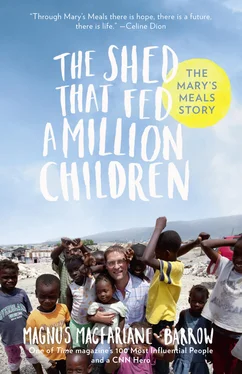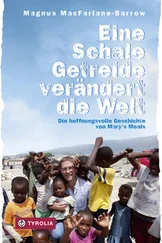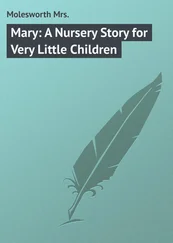I began to understand for the first time why the larger aid agencies often saw some smaller charities’ efforts as amateurish and dangerous. As we all settled down for the night to sleep outside, beside our row of parked trucks, Julie and I quietly discussed our misgivings about working with these people, but we realized that right now, having reached a part of central Bosnia-Herzegovina that neither of us knew, we had no real option but to go on with them towards Tuzla. And besides, we needed to tell all the donors back home that we had seen their donations arrive safely. I climbed into my sleeping bag in a bad mood. Our co-workers had not even brought decent supplies for us to eat, and going to bed hungry never failed to make me self-piteous. During the night, we awoke to find a pack of wild dogs running over us. It was the weirdest sensation. They scampered over our sleeping bags, apparently disinterested in us, and disappeared into the pitch-black. I wondered what had happened to their owners and what they were running from or to.
The next day the roads got worse. The stronger trucks were now towing others up the steepest hills and progress became painfully slow. For our own safety, we really needed to reach Tuzla before nightfall, but that looked less and less likely. As the afternoon wore on, the number of stops to repair punctures increased and I became worried that some of the trucks would simply break down beyond repair. And as the light faded, the endless black forest on each side of the road began to look a little sinister. Just as the situation started feeling very bleak, a convoy of huge ‘all-terrain’ Norwegian trucks drove up behind us. Their friendly drivers – civilians working alongside UN troops – saw our predicament and stopped to ask if they could help. They were even kind enough not to laugh at us and said they would accompany us to their base in Tuzla, towing us whenever we needed their help. With our unexpected ‘guardian angels’ pulling us on, we began to make steady progress. Finally, we arrived at the UN base at 3 a.m., where we all collapsed exhausted into a deep sleep – but not before Julie had the chance to tell me excitedly that she had driven one of the huge all-terrain vehicles on the last leg of our journey through the night. She told me this as if her biggest lifelong ambition had just come true. I began to think she might just be a little weird.
The next morning we drove into the town of Tuzla and were met by a grateful but tired-looking mayor. We happily unloaded our precious cargo – thousands of boxes of dried food, soap, nappies – into a makeshift little warehouse from where it was being brought in manageable loads to the refugees at the nearby airfield. Later, we ourselves arrived at the huge camp, now home to 30,000 people. We walked down a path between the tents. A girl was trying to wash her hair in a bucket, while nearby an old lady in a headscarf was struggling to make a fire with a little pile of cardboard. In one tent medics were examining severely malnourished children with gaunt expressionless faces. I realized it was only ten days since the fall of Srebrenica. Ten days since these women and children, sitting outside their tents, emaciated and sunburnt, had watched the murder in cold blood of their husbands, sons and fathers – and many other horrors besides. Ten days during which they had walked through the forests in terror. On the way, at least one of them, a twenty-year-old called Ferida Osmanovic, hanged herself from a tree with a scarf. And while they had endured these things, I had been moaning about my own lack of sleep and good food.
While our recent travelling companions set off on the return journey back to Split along the same the roads we had just travelled, Julie and I decided to take our chances with a military helicopter flight that the Norwegians told us about. We were advised to assemble at a nearby landing pad and wait for its arrival. The first day it never came. The soldiers waiting with us told us it was because they had been unable to find sober pilots. I had thought they were joking but the next day, when the enormous helicopter did finally land, the Ukrainian crew members who emerged to unload the cargo were clearly very drunk indeed. Our Norwegian friends had told us that no one was allowed on these helicopters unless they had a flak jacket. We had no such thing and when we explained our predicament to a friendly UN monitor, also waiting for a lift back to Split, he kindly lent us some blue postbags, saying that they were the same colour and shape as the standard flak jackets.
‘Just clutch them as you board and the crew will never notice,’ he advised us.
He was correct. As we climbed into the cavernous empty hold of the helicopter, the crew stared at us with inane drunken grins and watery eyes and I realized we probably could have been holding anything at all, or nothing, and they would have been oblivious to it. The beast swallowed us like Jonah’s whale and took off. We bounced about in the huge metal barrel, as the pilots employed ‘tactical flying’ which meant flying horribly low, hugging the hillsides and swinging from one side of the valley to the other. This presumably was necessary to reduce the risk of being shot down, but I did wonder how much of it was just caused by drunk driving. Either way I secretly wished we had decided to return by those forest tracks. But we did eventually land safely in Split and found our large truck, Mary, waiting faithfully to take us home. We would have hugged her if our arms had been long enough.
2
A Woman Clothed with the Sun
To believe in something and not live it is dishonest.
MAHATMA GANDHI
Right through our childhood and beyond, the River Orchy was normally our friend, especially on days like this when the incessant rain and gushing feeder streams had it lapping the edge of our only road out. The prospect of a flooding river cutting us off from the rest of Dalmally was usually an exciting one, particularly when it meant a day off school. The Orchy had been a water playground running through every season of our childhood. On warm summer days we would carry our rubber dinghy up to Corryghoil, a slow-moving pool with a sandy beach, and swim in the cool deep water. Sometimes Dad would put the little boat on his old Rover trailer and take it further up the glen so we could ride it over waterfalls and beneath overhanging branches, all the way down to the old stone bridge. Occasionally in the winter the ice froze thick and we would meet our friends who lived on the other side, to ‘skate’ in our trainers or play ‘ice hockey’ with our shinty sticks and a stone for a puck. In the autumn we spent long hours trying to catch salmon as they battled upstream to spawn, our rare successes worth the wait, as we returned home victorious with a delicious silver fish and excited tales of how it had been caught.
But on this late autumn day in 1983, we worried as we watched the water’s creeping invasion of the fields below our house and noticed that neighbours Alasdair and Donald were moving their sheep to higher ground, for the following morning we were meant to be on our eagerly awaited flight to Yugoslavia. Long before the time arrived to begin our overnight drive to Heathrow Airport, the river was in full flood, the road submerged under an impassable torrent. It was then Dad explained he had thought ahead. He had parked our car earlier in the day, beyond the part of the road now flooded, and then walked back home. He handed us a torch and told us to get moving along the muddy hillside path above the flooded road. And so it was that our life-changing adventure began with a walk through darkness and driving rain, ankle-deep in mud with our luggage on our backs, while laughing at how Dad was always one step ahead.
It had all begun a few weeks earlier as we were sitting round the kitchen table after breakfast. Ruth, my sister, back home on holiday from university, looked up from her newspaper and said, ‘Look at this! It says here there are reports that the Virgin Mary is appearing to some teenagers in a place called Medjugorje in Yugoslavia!’ An excited conversation ensued. We were a devout Catholic family and knew about famous places like Lourdes where Our Lady had appeared in times gone by. We had even been, the previous year, on a family pilgrimage to the Marian shrine of Fatima in Portugal. But the idea that Our Lady could appear today, in our own time, was something that had never occurred to us before.
Читать дальше












